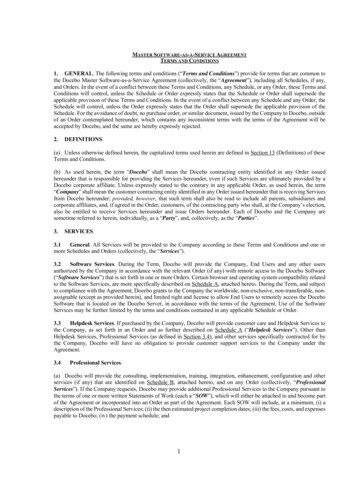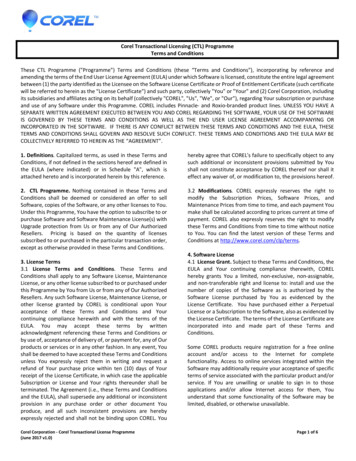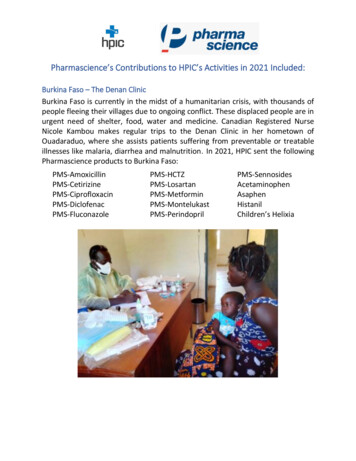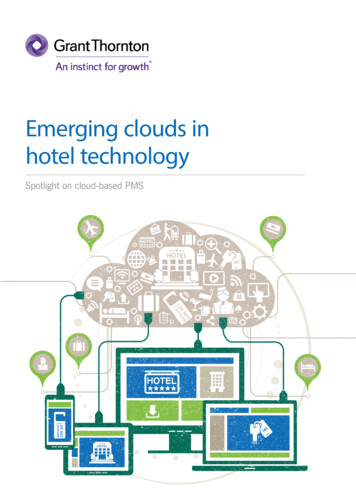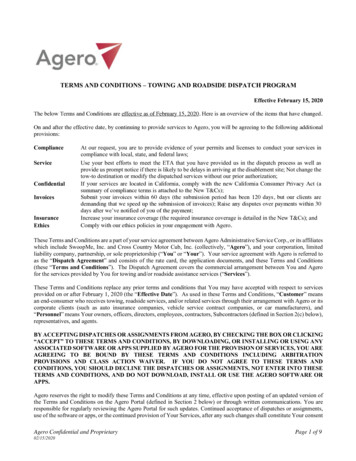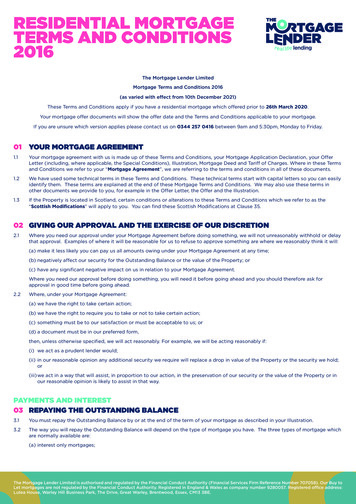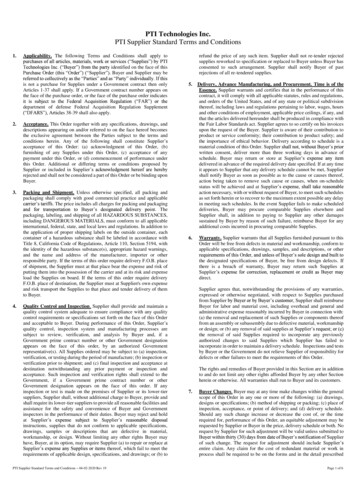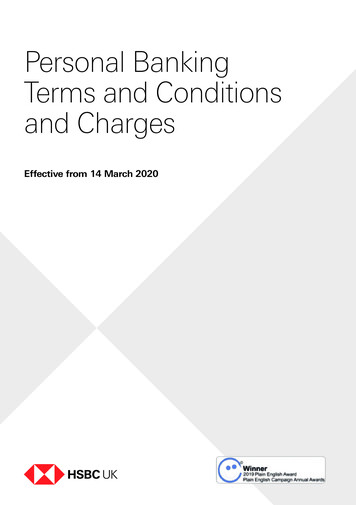
Transcription
Personal BankingTerms and Conditionsand ChargesEffective from 14 March 2020
2ContentsPart 1 – Our agreementYou and HSBC UK: Our agreement1. How we’ll keep in touchContentsPage35Your account - who can use it and keeping it secure2. Checking it’s you and keeping your account secure3. If you want to use a third-party app or web provider4. Can someone else act for you?5. Joint accounts6. Restricting your account access6689910Giving each other information7. Statements and other information we’ll give you8. Your information – when we need it and what we do with it9. About tax11111111Payments in and out of accounts10. Paying money into your account11. How you can make payments from your account12. Cancelling or changing payments (other than cheques)13. When payments go wrong – what we’ll do14. When payments go wrong or money goes missing from your account – your rights15. Refunds12131520212326About overdrafts16. Overdrafts2727Our relationship with you17. Our ‘right of set-off’ to reduce the amount you owe us18. Changes we can make19. Closing your account or ending this agreement20. How we can transfer accounts21. Transferring this agreement22. When we aren’t responsible for things that go wrong23. Which country’s courts and laws apply?2828293234343535Information to help manage your account36Part 2 – Additional product terms1. Current accounts2. Savings accounts383943Part 3 – Interest rates and charges1. Important information about interest rates and charges2. Charges for overdrafts3. Other charges46464649
Part 1 – Our agreementYou and HSBC UK:Our agreementBy opening an account with us, you’re setting up an agreementbetween HSBC UK Bank plc and you, the person or personswe’ve opened one or more accounts for. You’ll find the termsof that agreement here.This agreement covers all our personal banking accounts and services, including foreigncurrency accounts. A personal account is for making or receiving personal account paymentsonly. It’s not for business accounts, or if you’re holding money for someone else eg in a trust.Ask us if you need more information about those kinds of accounts or services.We ask you to read the terms because they’re what you’re agreeing to. They’ll also be usefulto help you understand your account. This includes what happens if things go wrong.For some of our products or services (eg overdrafts and Online Banking), the terms we give youwhen you request the product or service will also apply.Sometimes we use specific terms that are standard in the industry. There’s a list of these termsat hsbc.co.uk/got. If you still need help understanding something, please call us on one of ourusual numbers. We’ll be glad to help.Some useful informationIn these terms, you’ll find some boxes with the symbol . These aren’tpart of our “agreement” with you but they give you some useful informationabout your account.3
4You and HSBC UK: Our agreementUseful information for youWhat you can dowith your accountThere are lots of waysyou can use your account:Mobile BankingBy downloading the appTelephone BankingOnline BankingAt hsbc.co.ukAt any HSBC UK branchIncluding using self-service machines.There are some services available at cashmachines and at the Post Office .Visit hsbc.co.uk/ways-to-bankto find out more.You can also make payments within andoutside the UK in different ways. Thisincludes setting up Direct Debits andstanding orders from your account.Current accountsIf you have an HSBC UK current account,we offer a debit card for makingpayments.With some current accounts, you can also ask for an arranged overdraft make payments by cheque.Some of our current accounts also haveextra benefits. Some of these may haveseparate terms. If we upgrade or transferyou to another account, you may losebenefits (or gain them).Read all about benefits in theWelcome Brochure for your account, visithsbc.co.uk/current-accounts or ask us.Savings accountsWith a savings account you can’t makepayments by debit card, cheque, DirectDebit or standing order. You also can’t havean overdraft on your savings account.You’ll find specific conditions for thedifferent kinds of accounts we offer inthe section ‘More information on ouraccounts’.
5You and HSBC UK: Our agreement1. How we’ll keep in touchContacting usYou can contact us by any of the methods shown in the table below.By telephoneFrom the UKFrom anywhere elseLost or stolen cards and PINs0800 085 2401 44 1442 422 929UK (including HSBC Advance)03457 404 404 44 1226 261 010HSBC Premier(including HSBC Jade)03457 70 70 70 44 1226 260 260Textphone03457 125 563 44 207 088 2077Online Bankinghsbc.co.ukMobile BankingHSBC Mobile Banking AppBSL Video Relay Servicehsbc.co.uk/accessibilityBy postAt the address at the end of this documentContacting youWe’ll use the most recent postal or emailaddress, phone and mobile numbers we havefor you. If you use Mobile Banking, we mayalso use in-app and push notifications.If there’s an emergency, we may also tryother numbers you’ve used to contact usin the past. We sometimes record these.We’ll also attempt to contact any emergencycontact details you may have given us.Sometimes we might record and monitor callsto help improve our services or for securityreasons.If you’re registered for Online or MobileBanking, we may also use ‘My Messages’and ‘My documents’ in Online Banking.We’ll let you know when we put somethingnew in My documents. This could be bytext message, e-mail or through some otherelectronic message. We won’t change ordelete things that are already in there.We’ll sometimes need to contact you aboutyour account and your relationship with us.So it’s really important that your contact detailsare correct and up to date. If anything changes,you must tell us as soon as you can butalways within 30 days. If you don’t, we won’tbe responsible if you don’t get information ornotices from us.
6Your account - who can use it and keeping it secureAccess to our services for everyoneWe usually communicate in English. We alsooffer some services and help in Welsh. Visithsbc.co.uk/help/hsbc-in-wales/ for moredetails.You can ask for a copy of these terms onpaper, in Braille, in Large Print or in audioformat at any time. You can find out allabout our BSL Video Relay Service, TextRelay and all our access services onhsbc.co.uk/accessibilityUseful information for youThere’s lots of help available to accessour services. We’ve set out some of theways we can help below. Hearing loops in branches. Sign language interpreter, speechto text translation or lipspeakerservices available in branch. Chip and signature cards insteadof a chip and PIN card. A larger Secure Key for accessingOnline Banking, with bigger keysand display, as well as audioinstructions and information.Just let us know what you need.Your account – who can useit and keeping it secureIn this section, we tell you about who’s allowed to use your account.We also explain how we check identity and how we can worktogether to keep your account secure.2. Checking it’s you and keepingyour account secureWhen you access your account, we need tocheck we’re dealing with you. We also needto check the request we’re following comesfrom you (or someone acting for you). If weget a cheque, for example, we’ll check thatthe signature on it matches our records.If you’re in a branch, we may ask for photoID (eg a driver’s licence). For everything else,if your security details are used, we’ll assumeit’s you. We’ll treat the request as if you hadauthorised it. That’s why you must be verycareful to keep your security details privateand not let anyone get access to any devicesyou use to make payments.We may add other ways of checking youridentity in the future.What do we mean by ‘security details’?We ask for security details to keep youraccount safe. We’ve set out some typesof security details below.
7Your account - who can use it and keeping it securePasswords, PINs, security codes,and memorable data.Biometric data (such asa fingerprint or voice ID).The codes and passwords you setup with us for Telephone, Online orMobile Banking.any information you use with a paymentdevice.Keeping your account secureWe’ll do all we reasonably can to keep youraccount secure. You must also help us todo this. This includes keeping your detailssafe, and keeping us up to date if you noticesomething doesn’t seem right. If you don’t, wemay block your account to protect you and usfrom unauthorised use. If you ask, we’ll tell youwhen the block will end.Useful information for youWhat do we mean by ‘payment device’?This is a device you can make paymentswith or use to access, or do certainthings on, your account (such as a cardor e-wallet on your phone).If we call you, we’ll never ask for yourfull security details.Useful information for youTips for preventing misuse of your accountsThings you should do Keep your security details and paymentdevice safe. Safely destroy any security details wesend you eg if we send you a letterconfirming your PIN. Sign your card when you receive it. Use different security details for differentthings eg if you have more than onecard, have different PINs for each. Take care when using your securitydetails. Make sure no one can hear orsee your security details when you usethem. Change your security details straightaway and tell us as soon as possible ifyou suspect, or you know, that someoneelse knows your details. Take care when you transfer a paymentdevice to someone else (eg if you sellyour phone or give it to someone forrepair). You should delete cards storedon it or in any e-wallets. You should alsodelete any biometric access (such asfingerprint, face or voice ID) includingaccess from any linked device.Things you shouldn’t do Don’t allow anyone to use your paymentdevice. Don’t tell anyone (other than a ThirdParty Provider) your security details. Don’t choose security details that can beeasily guessed by anyone else. Don’t write down your security detailsin a way that other people would easilyunderstand. Don’t log in, or stay logged in, to adevice that’s not in your full control orpossession.You can find more tips on our website.
8We’ll let you know in the quickest and mostsecure way if we think there’s somethingwrong. This might be a text or a phone call.We will do this, for example, if there’s actualor suspected fraud on your account or threatsto your account security.You must contact us as soon as possiblein these cases.Your account - who can use it and keeping it secureWe’ll ask for information or other help we needfrom you. We may also help the police, and askyou to do this too.You must not use a payment device or chequeafter you have reported it lost or stolen or youthink someone has used or tried to use it.You must destroy it and return it to us ifwe ask you to. When someone else tries to access, or hasaccessed, your account using a cheque orpayment device (and whether or not theyhave your security details). Or if a cheque, payment device or securitydetails have been lost or stolen.3. If you want to use a third-party appor web providerYou may want to use an app or web servicewith your account. They can do things likelet you see information about all your onlinepayment accounts, whoever they’re with (itcould be banks, building societies or creditcard issuers). They can also make paymentsfrom those accounts. We call these companiesthat provide these apps or sites ‘third partyproviders’ or ‘TPPs’.If you want to use a TPP, this agreementbetween us still applies. When you sign upto use TPP services you need to give the TPPyour permission for them to do these activitieson your account. You should check theinformation the TPP gives you carefully to makesure they’re authorised. If they’re in the UK,they should be authorised by or registered withthe Financial Conduct Authority (the FCA). Ifthey’re outside the UK but in the EEA it shouldbe regulated by an EEA regulator.If you give your security details to a TPP, we’llassume that it’s you who’s allowing us to letthem see information about your accounts andto initiate payments. You’ll be responsiblefor any payments made as a result. But ifwe’re aware that an unauthorised third party isusing your security details, we’ll block accessto your accounts.If you notice a problem with a payment whileusing a TPP, please contact us right away.Useful information for youWhat’s the EEA? The EEA is allmember states of the European Unionand Iceland, Liechtensteinand Norway.
9Your account - who can use it and keeping it secure4. Can someone else act for you?If you’re not able to use your account for anyreason, another person may be appointed toact for you. This could be because of a physicaldisability or mental incapacity.You might also want another person to useyour account for you. For example, becauseyou’re travelling abroad or you’re in the armedforces. In this case, you can put an officialarrangement in place with another person.The most common arrangements are ‘thirdparty mandates’ or a ‘Power of Attorney’.The type you need depends on your situationand you’ll need to sign a legal document.Useful information for youTo find more information about what todo, visit -theirmoney/When we’ve had instructions from you, and theright document, we’ll allow the chosen personto use your account for you. This agreementwill still apply and you’ll be responsible foreverything they do. This is even if they makeyou break this agreement.In some serious cases, eg if we’re told youhave a mental incapacity, we might limitaccess to your account until we get legal proof.We won’t follow instructions given under a‘Power of Attorney’ if we know that a person’slegal authority to act for you has ended.We’ll remove a ‘third party mandate’immediately. We’ll do this if: you ask us to; we think the person’s misusing youraccount; or they make you break this agreementor any law or regulation.5. Joint accountsAny joint account holder can use the account.They can get information about the accountand ask us to make or stop payments. Theycan also apply for an arranged overdraft, andclose the account and have the money in itpaid to them.If we agree to provide an overdraft,you’ll each be responsible for repaying it.If one of you tells us there’s a dispute betweenyou, all of you must agree to what is done onthe account. But if there’s no money in theaccount and no overdraft, any one of you canask us to close it.If all of the account holders agree, we canconvert an account from joint names to a solename. You can also change a sole account toa joint one (unless it has previously been joint).If you do this, the new account holder(s) cansee all the account information. This includesfrom when it was a sole account.If an account holder dies, we can transfer theaccount into the name of the other accountholder(s). To do this, we need to see proof ofdeath (usually a death certificate).
10Your account - who can use it and keeping it secure6. Restricting youraccount accessBlocking your account and your accessto servicesWe can block any payment device (and youraccess to related services such as Telephone,Mobile and Online Banking). This could bewhere. There’s a significantly increased risk thatyou won’t be able to repay any money youowe us. We suspect fraud or criminal use of thepayment device. We have security concerns (eg if we knowor suspect your security details and/or thepayment device have been misused).We’ll only block if we reasonably believeit’s necessary. And we’ll usually let you knowwhy straight after, unless we’re prevented bylaw or any regulation or for security reasons.We’ll unblock the payment device as soon asthe reason for blocking it ends.If you don’t use your accountIf you’re not using all of your accounts, we mayrestrict payments in or out to protect againstfraud but we’ll let you know first. We’ll do thisafter 12 months for current accounts and aftertwo years for savings accounts.
11Giving each other informationGiving each other information7. Statements andother informationwe’ll give you8. Your information –when we need it andwhat we do with itWe’ll always keep you up todate with what’s happeningin your account.You must give us any information wereasonably ask for as soon as possible.If you don’t, or we suspect fraudulent orcriminal activity of any kind, we’ll have to takeaction. For example, we might:You can always get information aboutpayments into or out of your account (andabout interest we pay or charge and any othercharges) . You can get this using Online, Mobileand Telephone Banking, from cash machinesor in our branches.We may ask you to choose whether you wantus to send a monthly statement. If you don’ttell us what you want, we’ll send statementseach month there’s been a payment out ofyour account since the last statement we gaveyou. If you tell us you don’t want monthlystatements, we may still send you statementsat a different frequency. We’ll explain this ifwe offer you the choice.We’ll send statements by post or, if you’reregistered for Online or Mobile Banking, we’llprovide statements online or through the appunless you ask for them on paper. We’ll alsosend statements by post if they aren’t availableonline or through the app.You can ask us for a copy of your statement.We’ll also send you a summary of any chargeson your accounts every 12 months. If youclose your account, we’ll send you a closingstatement.You must let us know as soon as possible ifyou think there are any unusual or incorrectpayments on your accounts. try to get it from another source; or block or close your account(s).You might not be able to use some bankingservices or keep banking with us.We’ll use your information as we explainin our Privacy Notice. Sometimes we’llalso give it to others. We explain whenwe might do this below. We’re required to by law. To protect ourselves, such as in any court case. We have a public duty to. For example,we may have to give it to a tax authorityin another country. You agree.9. About taxYour tax responsibilities include things like filingtax returns, paying tax and following any othertax laws or regulations. Your responsibilitiesdepend on where you live, where you dobusiness and some other things. It’s up to youto make sure you follow tax rules. This alsoapplies to ‘connected persons’ (eg anyone yousend a payment to, who runs your account foryou, or is entitled to money in your account(s)etc.). We can’t provide tax or legal advice sodo speak to an independent advisor.
12Payments in and out of accountsPayments inand out ofaccountsThis section is about paymentsin and out of accounts. Someaccounts have different termswhich are set out in Part 2of this agreement. You canfind more about charges forpayments in Part 3 of thisagreement.All payments and decisions about paymentsare made on working days. How we managepayments can depend on whether the paymentis made within the European Economic Area(EEA) and if it’s in an EEA currency.What’s a working day?A working day is usually Monday to Friday(excluding public holidays). Branch openinghours will be the working day for paymentsat a branch. For payments made by FasterPayments our working day is 24/7.Making payments in a foreign currencyor outside the UK:You can use your account to make andreceive payments to and from most othercountries. And in most major currencies.Please ask us if you want to know about aspecific currency. There are charges for sometransactions outside the UK. Some of thesemay come from another bank or organisationinvolved in the transaction. For currentexchange rates, get in touch by coming intoa branch or through Telephone Banking.
13Payments in and out of accounts10. P aying money into your accountThere are lots of easy ways to pay into your account. Here’s how.We also tell you when you’ll be able to use the money and whenit will count for working out interest.Cash and electronic paymentsHow you pay the money inWhen you can use the money and whenit counts for working out interestCashA branch counterStraight awayUK Post Office branches (you can payin up to 1,000)Straight away if you use your debit card, otherwiseright after we receive itSelf-service machines that acceptpayments inStraight away if the machine says it automaticallycounts your cash. If it doesn’t, then the same workingday (or the next working day if you pay in after thecut-off time displayed on the machine)Other banks (if they allow this theymay charge). This also applies to HSBCbranches in the Channel Islands and Isleof ManRight after we receive itIf you pay cash in a foreign currency, we’ll convert it into pounds sterling first using the HSBCExchange Rate at the time we receive the cash. The timings above will then apply.Only the account holder or someone appointed officially to run your account can pay cash overthe branch counter or using a self-service machine.All other payments (apart from cheques)In pounds sterlingStraight awayIn foreign currencyRight after we’ve converted it into pounds sterlingusing the HSBC Exchange Rate (or the HSBC GlobalTransfer Exchange Rate) at the time we receive thepayment
14Payments in and out of accountsChequesWe process all cheques as images. Thatincludes where you pay in a paper chequeat a HSBC UK branch. An imaged chequeis a scanned digital image of a paper cheque.This allows them to be processed electronicallywhich is much faster than just using thepaper version.We have to collect and process paymentsmade by cheque from the paying bank. We’veshown how long this takes in the table below.If you pay in a large-sized cheque or one for alarge amount, we may carry out some furtherchecks. That means it might take a bit longerfor it to be processed.Imaged chequespaid into HSBC UKbranches or receivedby us for processing:Working days after theworking day that thecheque is paid inEg if you pay a chequein on a TuesdayYou’ll start earninginterest1On WednesdayYou’ll be able to use themoney1 (as soon as the paymentis shown in your account –this could be any time thatday)After the money appears in youraccount on Wednesday (this could beat any time that day)The paying bank can’trecall the money andwe can’t take it out ofyour account1After the money appears in youraccount on WednesdayThese timings are different if you’re paying acheque in at a branch, you’ll need to do thisbefore the cut-off time for processing.This will be either: 3.30 pm; or when counter service closes,whichever is earlier. So if a counter closes at3pm, that will be the cut-off time.If you pay a cheque in at a UK Post Office or into an HSBC branch in the Channel Islandsor the Isle of Man. Instead, these timingswill begin when we receive it, normallyon the next working day.If a cheque has been paid into your accountbut is returned unpaid (eg it bounces), we’lltell you and take the money back out of youraccount. This may put you into an unarrangedoverdraft. We may be able to ask for paymentagain from the paying bank.Useful information for youIf something goes wrong and we havetrouble scanning the cheque it mighttake longer than usual to process. Thiscould happen, for example, where thewriting isn’t clear on the cheque.
15Payments in and out of accountsForeign currency chequesIf you want to pay in a foreign currencycheque from a bank outside the UK,Channel Islands or Isle of Man, we’llcheck whether we can accept it.There may be exchange controls that mean wecan’t. If we can accept it, you’ll be responsiblefor our charges and any charges made by theforeign bank or agent we use. We’ll take thesecharges from the account you want the chequepaid into.We have to either collect or negotiate thecheque. If it’s in a different currency to theaccount, we’ll convert this to pounds sterlingfirst. If you have a Currency Account, we’llthen convert it to the currency of your account.We’ll use our standard exchange rate.NegotiateThis means we work on trust and assumethe cheque will clear. We’ll pay the chequeamount into your account on the workingday after we receive the cheque.CollectThis means we’ll send the cheque to thepaying bank and only pay the money intoyour account when we receive it. How longthis takes depends on the paying bank or itscountry (you can ask us for details). We mayuse an agent to collect the payment.If there’s a problem, the foreign bank mightreturn the cheque or ask for the money back.If this happens we’ll need to take enoughmoney out of your account to cover thepayment in the foreign currency. So, if theexchange rate has changed, it’s not likelyto be the same as the amount we paid in.We’ll do this even if you have already spentthe money or if it will put you into anunarranged overdraft.11. How you canmake payments fromyour accountCash withdrawalsYou can make cash withdrawalsat any of our branches or at Post Office branches, or by using a cash machine.There may be limits to the amount youcan take out. We’ll tell you what theseare when we send you your debit card.Useful information for youIf you withdraw cash outside the UK,cash machine providers outside theHSBC Group may charge you to usetheir cash machines.Debit card paymentsIf you use your debit card for a cashwithdrawal or payment, the moneywill come out of your account after wereceive confirmed details from the cardscheme. This may happen on a workingor a non-working day.What do we mean by card scheme?This means card network operators suchas Visa or MasterCard.If you use your debit card for a transaction ina foreign currency eg a cash withdrawal or apayment, the card scheme will convert it intopounds sterling. They’ll do this on the day theyprocess it using their exchange rate. You cancheck the exchange rate by visiting the cardscheme’s website.
16Payments in and out of accountsIf your personal circumstances change, wemay replace any debit card we’ve sent youwith a different type.Faster Payments online(some accounts only)With some of our accounts, you can sendmoney within the UK on any day using FasterPayments online. If you’re not sure whetheryour account is one that lets you make FasterPayments online, please check with us.CHAPS paymentsCHAPS is a same-day electronic transferfor payments within the UK, often usedfor large amounts (such as if you’rebuying a house).Standing orders and Direct DebitsYou can set up a regular payment fromyour account, eg by standing order. Youcan also arrange to make a payment ona chosen date online, by phone or at abranch.You can also set up Direct Debitpayments.Paying by cheque(some accounts only)To make a cheque payment, write thename of the person you’re paying, theamount in numbers and words, and thedate. Don’t forget to sign it.If you want to cancel a cheque you must tell usthe same details and the cheque number. Forimaged cheques, you’ll need to do this beforethe imaging process begins. We can’t cancel itafter it’s been imaged.We usually make the payment when we getthe cheque. We do this even if it’s dated in thefuture. Putting a later date on a cheque won’tmake the money come out of your accountany later.If we get a cheque more than 6 months afterit was written, we may pay it, but we don’thave to.Useful information for youA few tips to keep cheques secure:Write clearly in blue or black ink.Try to write so that the chequecan still be read, but there’sno room to add anything inany gaps.1If you’re paying a bill, you mayneed to add a reference numberto make sure the payment goesto the right place.2Draw lines through any blankspace on the ‘pay’ line.3DatePayMr1 Andy Sample201/01/20 1,000One thousand poundsAccount PayeeFrom 19 April 2020, you can find out how thecost of making card transactions within theEU compares to the foreign exchange rate(s)issued by the European Central Bank. To do sovisit nsert reference hereSignedCheque NoBranch Sort CodeAccount No12345612345612345678
Payments in and out of accountsPaymDownload the Paym app to yoursmartphone. You can make paymentsusing just the mobile number of theperson you’re paying.Useful information for youGetting payments right– some tips Make sure there’s enough moneyin your account (including anyarranged overdraft). Make sure the payment details(such as sort code and the accountnumber of the person you’re paying,and amount) are correct. Be careful to give us the correct nameof the person you’re paying. In future,we’ll need to check it before we canmake the payment.The information we need from youTo send money from your account, we usuallyneed the sort code, account number (or theequivalent details for payments outside theUK). We’ll usually also ask for the full name ofthe person you’re sending money to, or whereavailable, a number that is linked to these, suchas a mobile phone number. We might alsoneed some other information.You need to make sure you give us the rightdetails, as we’ll make the payment using onlythe information you give us. It’s up to you tocheck the details are correct.17
18Payments in and out of accountsCut-off timesThe ‘cut-off time’ is the latest time on any daythat we can do things you ask us to, or add apayment to an account.The table below gives you information on thetimings of your payment.We only make certain payments on a workingday. So if you ask us to make a payment afterthe cut-off, the timings will start from the nextworking day. It also tells you how long payments take toreach the bank of the person you’re payingafter we’ve received your request.Sending money It shows the cut-off time for you askingus to make payments.When the money willreach the bank of theperson you’re payingCut-off timeSending money within the UK in pounds sterlingBetween accounts at HSBCUK, first direct and someM&S Bank accountsTo accounts atother banks11.45pmStraight away11.45pm (Faster Payment)Straight away4.45pm (CHAPS)Same working daySending money in foreign currencies or outside the UK in pounds sterlingTo accounts in the EEA ineuro and pounds sterling3.30pmNex
HSBC Premier (including HSBC Jade) 03457 70 70 70 44 1226 260 260 Textphone 03457 125 563 44 207 088 2077 Online Banking hsbc.co.uk Mobile Banking HSBC Mobile Banking App BSL Video Relay Service hsbc.co.uk/accessibility By post At the address at the end of this document Contacting us You can contact us by any of the methods shown in the table .


